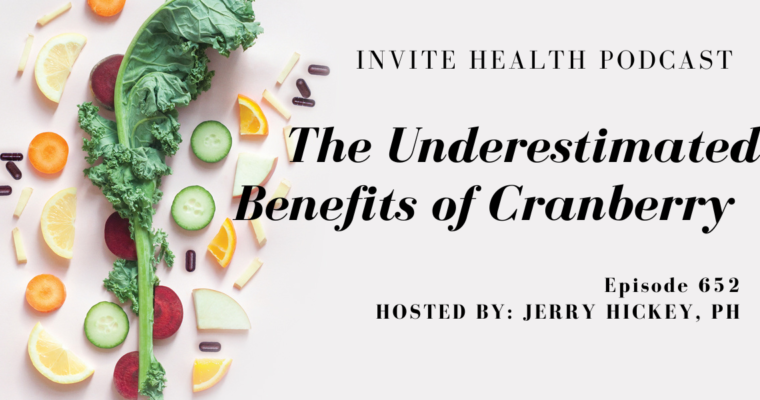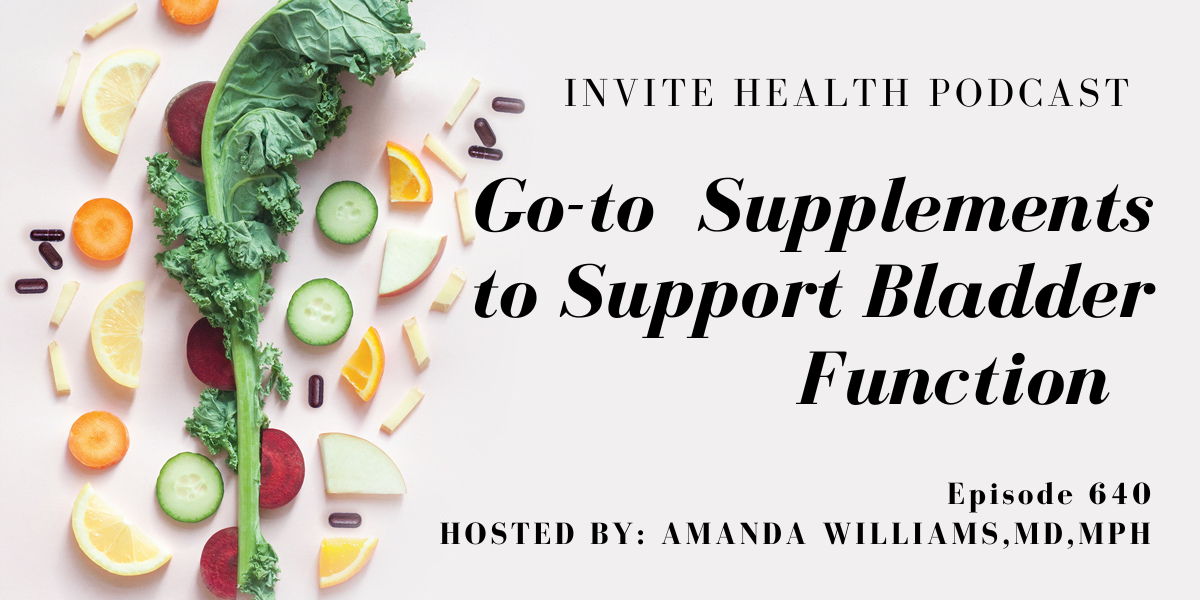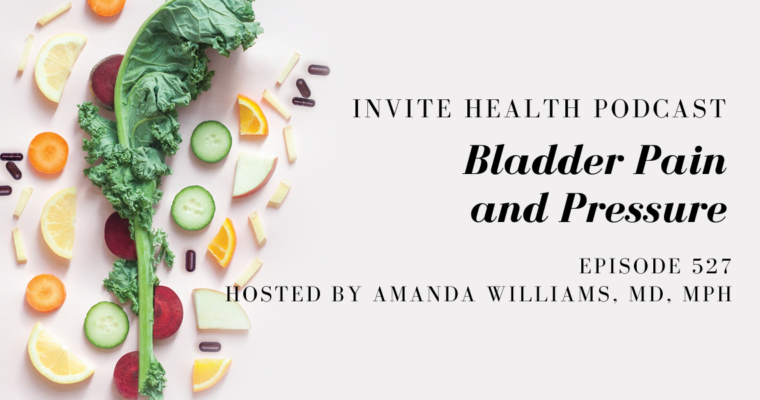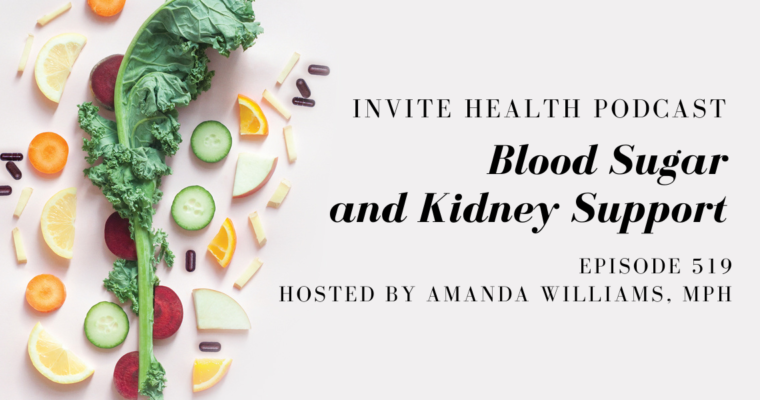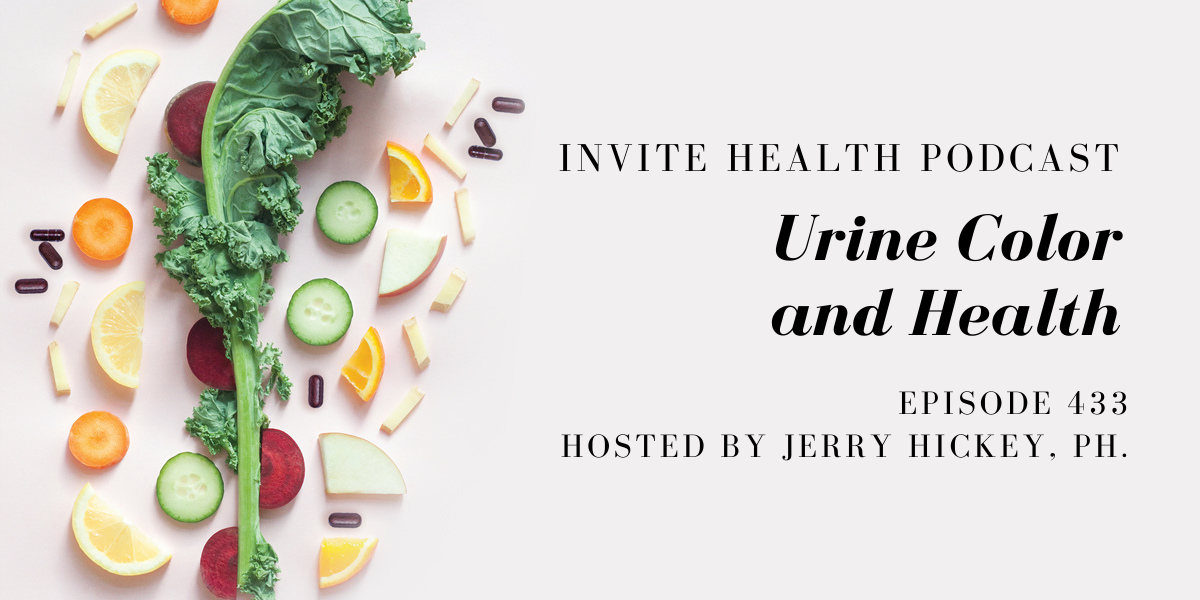Subscribe Today!
Please see below for a complete transcript of this episode.
Go-To Supplements to Support Bladder Function, Invite Health Podcast, Episode 640
Hosted by Amanda Williams, MD, MPH

*Intro Music*
InViteⓇ Health Podcast Intro: [00:00:04] Welcome to the InViteⓇ Health Podcast, where our degreed health care professionals are excited to offer you the most important health and wellness information you need to make informed choices about your health. You can learn more about the products discussed in each of these episodes and all that Invite Health has to offer at, www.invitehealth.com/podcast. First time customers can use promo code podcast at checkout for an additional 15% off your first purchase. Let’s get started. † [00:00:34]
*Intro Music*
Amanda Williams MD, MPH: [00:00:40] Welcome to the InViteⓇ Health Podcast, I am Dr. Amanda Williams, scientific director at Invite Health, and we know that there are many concerns that can pop up along the way as we travel through our journey on life and many conditions that people experience and they reach out to me with on a regular basis. So I thought it was only fitting to do a podcast that was focused on this specific topic and that is urinary tract health. I understand that, it’s one of those things that people like to shy away from if you have a UTI. If you’re a male who’s experiencing frequent. trips to the bathroom, perhaps waking you up in the middle of the night. It’s an area that many people they don’t want to talk about. But we do need to address this because it’s very common and the prevalence rates in this country when it comes to urinary tract infections, as well as issues such as cystitis, which is a painful bladder syndrome, interstitial cystitis is the actual technical term for it, but we just call it bladder pain syndrome, this affects many americans, both men and women. And certainly when it comes to issues with urge related problems, urge incontinence certainly is a common problem. So I want to talk about these things because we know that according to the National Ambulatory Medical Care Survey, that UTIs, urinary tract infections, they account for millions of patient office visits each year as well as going to the E.R, so presenting to the emergency room with a urinary tract infection and for unfortunately many of those individuals, they end up becoming hospitalized. So we know that the incidence of urinary tract infections quite common, recognizing that this is oftentimes looked at as being a much more problematic issue for women than men, and in many regards, this is true. However, we do see that many men, especially as they grow older, are more prone to the development of urinary tract infections, and this is because of the prostate function, so incomplete emptying of the bladder in combination with the enlargement of the prostate. † [00:03:08]
[00:03:09] So what can we be doing? What are the different nutrients that we can include into our supplementation routine to address some of these underlying issues? Because when you look at the lifetime chance of a female having a urinary tract infection, it’s very, very high. Now where the problem arises with many females, is chronic, repetitive urinary tract infections. And this is a real issue that so many women do have to, you know, contest with throughout their lives and they’re running back to their doctor. Do the urinalysis, yes, you have a UTI, they put you on an antibiotic. Oftentimes that comes with a secondary fun little yeast infection. So after being on the antibiotic, you will end up with a yeast infection, then they have to treat the yeast infection. So it’s kind of like this maddening cycle that many individuals end up going through. As I mentioned, this is oftentimes more common in females of all ages. But when you get to men, men, once they reach about 60, 70 years old, this is where we really start to see this uptick in chronic repeat or recurrent urinary tract infections, and this is associated with the enlargement of the prostate. So we know there are a lot of different things that actually cause urinary tract infections. We can look at inadequate fluid intake, as being a primary driver to this, which throws off the acidity within the urine itself. But we know that pesky pathogens are a driving force. The vast majority are caused by E coli bacteria, but there are certainly other germs out there that can create havoc within the urinary tract lining, we’ve all been probably taught throughout our lives that if you have a UTI, you need to increase your fluid intake and maybe look at drinking some cranberry juice, which isn’t a bad idea. The problem is, is that, if the cranberry juice that you’re drinking is a cranberry juice cocktail, for example, you’re going to be getting a very large amount of sugar. Which is just adding insult to injury when you think about the breeding environment of bacteria, they love that sugar. So is drinking cranberry juice cocktail your way. out of a home remedy when it comes to a urinary tract infection? Likely not. So this is why I oftentimes when I’m talking to folks if they are having recurrent urinary tract infections, we look at cranberry extract. So just taking the powerful polyphenols that come from the cranberry that provides you with that mannose. Mannose is really quite interesting because mannose is a carbohydrate that’s naturally occurring in the cranberry. But what it does is, it creates kind of like a slippery slope within the urinary bladder itself. So it makes it very difficult for bacteria to be able to adhere to the urinary wall. So hence, if you are one of those individuals, male or female, who experience chronic repeat UTIs, cranberry extract is something that you definitely want to incorporate into a daily supplementation routine. † [00:06:39]
COMBATING AN OVERACTIVE BLADDER, INVITE HEALTH PODCAST, EPISODE 617>>LISTEN NOW!
[00:06:41] Now, if we are currently in an acute situation and we’re dealing with a urinary tract infection, what are some of the things that we can be turning to? Well, certainly we can go with a high amount of that cranberry extract, but we can also look at the use of probiotic for women. Now, while it’s called Probiotic for Women, men can also be utilizing this formulation. So it has four different strains of Lactobacillus in it, combined with garlic and thyme extract, so I’ll talk about the science on those in just a minute. But we know that this particular product, while the name is called Probiotic Women, because more women are prone to the urinary tract infections and the different issues that can arise, such as chronic yeast infections, chronic bacterial vaginosis infections. We named the product Probiotic Women, but definitely the bacterial strains are also found in men, and to help the urinary tract recolonize these healthy strains, the use of Probiotic Women would be incredibly advantageous. So we know that as we get older, as with anything in the body our ability to maintain the same function that we had when we were maybe 20 years old, can start to diminish. And we certainly see this to be the case when it comes to, Bladder health. The increase frequency of urination is more common with advanced age. We know that individuals over the age of 60 really start to complain about, you know, get up 1, 2, 3 times in the middle of the night, this both men and women. So,you have to look at the reason why that is. We have to look at the causative reasons and this is usually hormonally driven. So having a comprehensive hormone test done is always advantageous because if you can see where along that hormonal pathway, the problem is arising then you can do a better job when it comes to addressing that concern. We can look at urinary incontinence, this is you know, brought on because of a couple of different reasons. But certainly we know that women in particular, a lot of the stress incontinence, the weakening of the bladder itself, because of, you know, maybe,past pregnancies and certainly the loss of estrogen going through menopause is definitely a driving force to this. So a lot of different things that we have to assess when it comes to urinary tract health. We have to look at the potential exposure from different bacteria, so pathogenic, reasons as to why we can have urinary tract issues, we can certainly look at the structure function components. † [00:09:34]
[00:09:35] A lot of men end up with chronic UTIs as they get older, we know that this is a big issue. BPH is a driving force, chronic prostatitis. There are bacterial causative reasons for prostatitis or an infection of the prostate gland brought on because of a bacteria. There are non bacterial prostatitis or inflammation that’s occurring within the prostate. In any case, we know that the majority of men who are dealing with BPH will have the complaint of increased urination, the change in flow rates, the stopping and the starting, getting up multiple times in the middle of the night certainly can be a problem. Because if you’re not getting good sleep, that’s an issue. And we can certainly see in women’s health when it comes to urinary tract infections, very, very common. So many women end up with chronic recurrent urinary tract infections, as I mentioned before, they get on this vicious cycle of going to the doctor being put on an antibiotic, oftentimes ending up with a yeast infection, then going back on a medication to treat the yeast infection only to get another UTI. So we know that water is very important, hydration, hydration. I always want to start off with that. But we can also look at different formulations that are geared towards supporting the health of the urinary bladder. We have a wonderful formulation called Bladder Hx. Really unique in terms of its makeup, it has different herbal extracts that are combined together, so it has three leaf caper in it, along with silica extract and pumpkin seed extract. Now we know that the pumpkin seed extract, this is really kind of unique because this has been studied in so many different aspects of human health and how it’s actually potentially aiding that benefit through strengthening up the bladder floor walls, which is important. So when we think about the issues such as stress incontinence or those hormonal changes, the loss of testosterone in both men and women can drive the weakening of the urinary bladder as well as those pelvic muscles. So the combination of these different nutrients in the Bladder Hx, is what makes this product really stand out. † [00:12:02]
[00:12:03] And we know that for individuals who maybe go in and talk to their. physician about problems when it comes to bladder health, they’ll give them a prescription medication. The problem with that prescription medication is the mechanism of action, how it’s actually working. You know to some degree, does it help with the bladder problem? Yes, but what’s the very well known side effect is that, it disrupts the way that your body actually makes the key and very, very important neurotransmitter acetylcholine. So if you’re not making acetylcholine, you’re going to have a hard time making memories. And that’s an issue, I worked with an individual, many years ago and we were talking about the bladder formulation, and she says, well, I’m on a medication, you know, for my doctor, I said well, how, you know, how effective do you feel it is? She goes, well, you know, I don’t necessarily feel like it’s getting worse, but I haven’t really noticed that it’s gotten so much better. And then I told her about the potential side effect when it comes to cognition and cognitive decline memory issues. And she was like, Oh, wow, that’s really interesting that you point that out because I’ve been experiencing this for the past couple of years and I’ve been on the medication for about three years, and she goes, I just chalked it up to just aging. You know, maybe I’m just getting older, I’m not as sharp as I once used to be. And so she went back, she talked to her doctor, she told her doctor, you know, I think, I’m going to, you know, stop using this medication. I’m going to try, you know, just through diet, exercise, as well as taking some different nutrients to see if this works better for me. And she started using the Bladder Hx. She was amazed not only that it was helping, in her opinion, much more than the prescribed medication, but how quick she noticed that her memory was coming back and she was like, oh my goodness, like I would have stayed on that medication and continue to have a decline in cognitive function and never been the wiser, just chalked it up to aging itself. So you have to be careful with a lot of those prescribed medications. But when you’re using the Bladder Hx, you’re getting this combination of the pumpkin seed extract, you’re getting the the isoflavones extract, which is very important, because it helps to maintain the structural integrity of the urethra coming out of the kidney of the ureters. And then you have the urethra coming out of the urinary bladder. In both men and women, this can start to shrink down, which is why oftentimes men have the issue with stopping and starting and stopping and starting. † [00:14:37]
[00:14:39] So the isoflavones really helps to create this hormonal balance and to restructure, restabilize the urethra itself and then having the three leaf caper and this which we know is definitely been shown to be highly effective when it comes to urinary tract health and even targeting bladder stone formation. There’s a lot of individuals who can get kidney stones, but you can also get bladder stones. And we know that that three leaf caper can be very targeted oftentimes we look at the different science on these different ayurvedic herbal remedies, you can start to see, well, okay, no wonder why people you know, certain parts of the world have turn to these extracts for a variety of different health benefits, because when people start, you know, making a tea with a particular herb and they’re like oh, well, that took away my chronic headaches. Or I start using this extract from this leaf and you know, it improves my urinary tract health, so there’s something to it. I always say you have to think about where medicine started. Medicine didn’t start with a big pharmaceutical company. Medicine started with the plant based nutrients that we only had access to so many hundreds of years ago. So looking at the Bladder Hx formulation and understanding why we combine the three leaves caper with that pumpkin seed extract with the isoflavones and it really comes down to the science of understanding how these nutrients are working synergistically together. And that’s very important, because when you’re taking a formulation, we want to make sure that the body is actually going to be able to respond to this. And in the Journal of Traditional and Complementary Medicine back in 2014, they assessed the utilization of pumpkin seed extract in terms of improving urinary disorders with individuals who had overactive bladder. So overactive bladder can occur in both men and women, so sometimes it’s a more common complaint in men of a certain age and because of the enlargement of the prostate. But certainly women can experience overactive bladder as well, and we can look at the stress incontinence and the weakening of those not only the pelvic muscles but the bladder itself. So the study was assessing the impact that pumpkin seed extract would have in a 12 week trial, and what was interesting was that just within the first six weeks of this 12 week trial, they started to see this significant shift in all of the individuals who were in the pumpkin seed group were like, wow, you know, I’m not feeling like I have to go to the bathroom all of the time throughout the day and throughout the night. And so you could see its effectiveness, which is why pumpkin seed extract has been turned to so frequently when it comes to issues such as overactive bladder and as well as, as I mentioned, some of the the weakening of the muscles, because we know that the pumpkin seed extract in and of itself, it works by means of kind of mimicking the action of testosterone, which is really kind of fabulous. And we know that both men and women experience a decline in testosterone production as we grow older. So, as men go through andropause, as women go through menopause, testosterone levels will start to diminish as those testosterone levels go down. Sometimes you think about just your skeletal muscle, you know, losing muscle mass that way, you know, lower sex drive. But we also have to recognize the lasting effect that that low testosterone has on your urinary bladder. And once again, we run into this problem where people oftentimes chalk it up as, oh, well, you know, I’m a female and I had, you know two or three children, so, maybe this is the reason or you have men who say, well, and maybe this is just part of the aging process, which both are true. However, we know that there are ways that we can make lifestyle modifications. We can make sure that we are not adding insult to injury by having a high inflammatory diet that’s going to worsen everything. And then we know that we can turn towards these different nutrients that have been shown to be highly effective when it comes to the regulation of urinary tract health. So that’s why the Bladder Hx formulation is to this day one of our most popular formulations because there are many people, as I mentioned, they don’t want to talk about it, but they do deal with urinary tract issues. So, is the Bladder Hx, the number one go to formulation if you’re having a urinary tract infection? No, not necessarily. Is it something that you could still take in conjunction with taking the cranberry extract, taking the quercetin formulation, taking the probiotic that’s geared towards urinary tract health known as the Probiotic Women? But men can take this as well. Those are the nutrients that you want to be using. † [00:20:00]
PROBIOTICS FOR MORE THAN IMMUNITY, INVITE HEALTH PODCAST, EPISODE 608>>LISTEN NOW!
[00:20:00] The Bladder Hx is really for the targeted approach for restructuring the urinary bladder itself, to strengthen the bladder, to allow for better functionality, so you’re not racing off to the bathroom multiple times in the middle of the night. So that you’re not sitting there during the day going, gosh, I have to go. And then you go and then 20 minutes later, I have to go again. This is what the Bladder Hx is geared for. The Bladder Hx is the combination of that three leaf caper shown in clinical trials to be highly effective at supporting bladder health, combined with the isoflavones, combined with that pumpkin seed, really excellent formulation. So definitely go to our website invitehealth.com, check out the Bladder Hx, the Probiotic for women, and of course the Cranberry extract. And I want to thank you so much for tuning in to the InViteⓇ Health Podcast. Remember, you can find all of our episodes for free wherever you listen to podcasts or by visiting invitehealth.com/podcast. Do make sure that you subscribe and you leave a review. You can follow us on Facebook, Twitter and Instagram at Invite Health today. And we will see you next time for another episode of the InViteⓇ Health Podcast. † [00:20:00]
*Exit Music*



